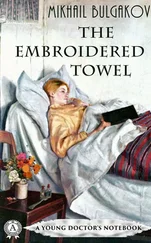Her thoughts were interrupted by a heavy blow against the door. The old women had lined up into a live battering ram, determined to break out.
Mokhova wasn’t afraid of the encounter. She already knew that the berserk old women could be subdued and pacified. Gorn’s example proved that. Mokhova had prepared a club in advance—a length of high-voltage cable with a heavy tin-bound core of metal wires.
A blow shook the door. Bed castors squeaked across the linoleum. Mokhova understood the tactical concept when the glass in the window above the door flew out and an old woman appeared in the aperture. The metal mesh of a bed had served as an excellent trampoline, tossing the old woman two metres up into the air. There were still fragments of glass in the frame and the old woman had impaled her stomach on them. Bleating in fury, she carried on trying to crawl through. Inverted Himalayas of blood slowly oozed down the door, making it look as if the old woman had put out bloody roots.
The second assault was launched more successfully. First a mop flitted about in the broken window, knocking out the shards of glass. A metal mesh bed base creaked again and a different old woman flew into the opening and started climbing down the door into the corridor.
Before the old woman could crawl out, Mokhova stunned her with a blow of the club. Then she opened the door and skipped back a few metres.
The old women came piling out of the ward and surrounded Mokhova. Gorn stood beside the door, indicating that she wasn’t getting involved in the fight.
The old women raged and howled, but they didn’t dare attack. Anyone who bared her teeth, as if she was about to pounce, earned a heavy blow from the club. Eventually an old woman by the name of Reznikova assumed the role of leader.
Stepping forward, she fended off a blow from the club with the mop. She raised her hand, calling for silence. Mokhova was in no hurry and she let the old woman have her say. An utterance vaguely resembling coherent speech followed; “Now, in the first place, first of all! We have to do! The same way as yours, that time! Today I did forgot, as they say! I did very bad today!”
The old women started murmuring approvingly in response to this gibberish and only Polina Gorn asked: “Reznikova, are you married?”
“Four years already!” Reznikova snarled, then swung round ferociously towards Mokhova, flinging up the mop.
The heavy cable whistled through the air and reddish-brown glop splashed out of Reznikova’s mouth onto the wall. Mokhova swung her arm back again and the old women trudged into the ward, whimpering discontentedly.
The pacification was achieved with minimal casualties: Reznikova had a broken jaw and the old woman who got stuck in the window over the door had deep cuts on her stomach. The injured were carried onto beds and Mokhova gave them first aid.
The effect of the Book was soon exhausted and the old women started dropping where they stood, like wind-up dolls in which the spring has run down.
Mokhova dragged the bodies onto beds, washed the blood off the door and swept up the glass.
The second group reading was not accompanied by any outbursts of aggression against Mokhova. The old women submitted to her completely, for which most of the credit belonged to Gorn, who influenced her comrades by using both argument and the club, which Mokhova had personally handed over to her, conferring upon her local authority.
Polina Gorn’s former garrulity did not return; her mind became rational and her thoughts succinct.
On Gorn’s advice Mokhova held new readings in different wards during the week. Gorn herself and about ten pacified old women attended the reading in order to suppress any possible focal points of rebellion.
The militia expanded every time that Mokhova was on duty. The Book had a salutary effect on senile organisms. In their normal condition, of course, the old women still did not possess even a hundredth part of the strength that the Book gave them, but their minds remained relatively clear.
In part they attributed the miraculous effect of the Book to Mokhova. They were old, lonely and abandoned by their own children, and the lingering spark of motherhood still glimmered in their hearts. Not the raucously domineering kind, but the self-sacrificing kind.
Gorn picked up this mood among the old women. The next night Mokhova was dubbed the “little daughter” and the old women were dubbed the “mums”. Gorn had thought through the ritual of adoption very thoroughly. In Mokhova’s view it was not particularly pleasant or hygienic, but Gorn persuaded Mokhova to go through with it.
Every old woman smeared Mokhova’s face with her vaginal secretions, as if symbolizing in this way that Mokhova had appeared in the world via her womb, and swore to protect the “little daughter” to her last breath.
Sixty old women went through the ritual. Twenty or so recent converts watched them, raging and roaring—and in the meantime they were pacified by overseers who dealt them slaps round the back of the head to drive home the idea that the greatest happiness they could ever be granted was to become a “mum” as soon as possible.
That same night Gorn said to Mokhova: “The staff! Get rid!”— and ran her hand across her throat, imitating the movement of a butcher’s knife.
The time had come for decisive action. Someone had snitched to the director about the noise at night, the broken window panes and the bruises. It was obvious that these emergencies occurred during Mokhova’s shift, and she could have faced serious unpleasantness. To carry out the operation Mokhova had the faithful Gorn and a militia of about eighty old women in total.
Mokhova informed the director, Avanesov, that at the weekend she intended to hold a recreational reading session in the women’s section, because she believed that the old female patients needed it. Avanesov did not object.
At eleven in the morning the female half of the old folk’s home started stirring. The corridors were filled with the creaking of beds being trundled about as the ambulatory old women moved their bedridden friends to the site of the assembly.
Mokhova was already experienced in reading rapidly and intelligibly, and she ran through the text in record time. Curious nurses came down several times from the men’s floor above. They were told that everything had been agreed with the director. One way or another, Mokhova won herself three hours’ grace. And when the duty sister called the director at home and complained about the pandemonium that Mokhova had caused, it was too late.
Avanesov arrived in time for the final pages. He curtly ordered the patients to be taken back to their wards. Mokhova openly raised her voice. Avanesov repeated his order, again in vain. He threatened to sack Mokhova for these outrageous excesses. The nurses and nursing assistants came running at the sound of his shouting. Taking hold of the heads of the beds, they started trundling the old women away to their wards. Seeing Mokhova still not responding to what he said, the director started walking towards her. And in that second Mokhova shouted out, “The End!”—and clapped the Book shut.
At that very moment the old woman Stepanida Fetisova grabbed the drip tube out of the vein of her ward neighbour Irina Shostak and deftly flung this improvised garrotte round Avanesov’s neck. Deprived of her flow of medication, Shostak fell into a coma, from which she emerged a minute later when the Book took effect.
The rebels were unstoppable. The slaughter began and Avanesov, strangled with a drip tube, became the first victim.
Mokhova’s army went through its baptism of fire at its official place of residence. As victims for its lynching it had four nurses, five nursing assistants, three female cooks, two dishwashers-cumservers, the building manager, the caretaker, who also doubled as the electrician and plumber, and all the patients in the men’s section, about fifty in total.
Читать дальше












